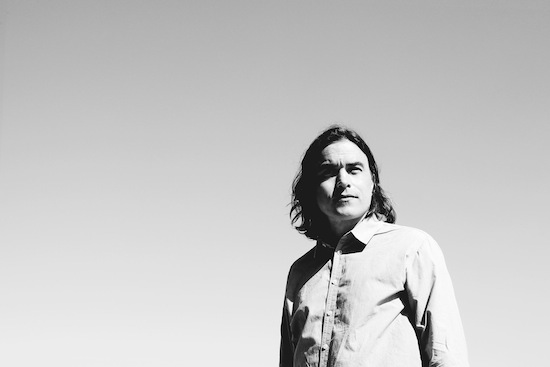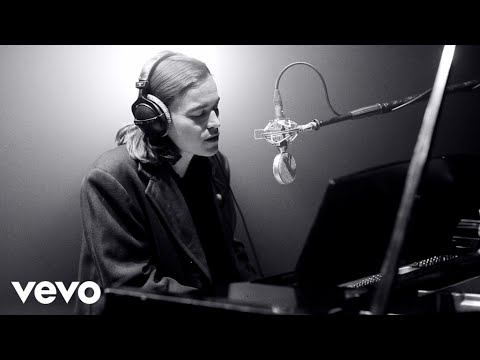Continuing his run of a release-per-year under his Moonface guise, Spencer Krug will shortly be releasing a new EP, City Wrecker. It comes in the wake of last year’s excellent voice-and-piano album Julia With Blue Jeans On, and is the fifth Moonface release since 2010, following on from Dreamland EP: Marimba And Shit-Drums, Organ Music Not Vibraphone Like I’d Hoped and Heartbreaking Bravery, his collaboration with Finnish Krautrock merchants Siinai. Now, Krug’s playing a show at the iconic Cecil Sharp House in London tomorrow to mark the new EP’s release. Ahead of that, we got on the phone to discuss the construction of the record, his difficult relationship with Montreal, an artist’s priorities and his closest encounter with death.
In what way have you tried to progress your sound from Julia… on the City Wrecker EP?
Spencer Krug: I don’t know, I wasn’t really trying to do that. It’s really just a small step away from that last record, as a lot of EPs are. There are a few new things on there, but they were written in the same way: just on a piano. And then I decided to do a couple of things differently. They’re not live off the floor like Julia With Blue Jeans is, because I wanted a different vocal sound, so we separated the piano and the vocal. And we added a few other instruments on there too.
I remember hearing both ‘City Wrecker’ and ‘Helsinki Winter 2013’ at your UK shows last year – when did the songs take form?
SK: Let me think [pauses]. ‘City Wrecker’ kind of came in between as its own separate thing, so that’s probably why I was playing it live. The last two tracks on the EP, I had written along with the Julia… stuff. And then the opening two tracks, I wrote for the EP. It was all written while I was still living in Helsinki. But yeah, I thought I’d maybe make a 7" with the first two tracks but then I decided to turn it into an EP, and finish writing those other songs.
The video for the title track is very interesting, who made it?
SK: Oh, these guys called Rairai from Helsinki. I was in town one day and we started talking about doing a live session that was… I think it was going to be used for a tour promotion. But then we decided to wait and put it out with this EP. It was supposed to be just a live session and then we mixed it up a little bit. The audio that you’re hearing is the audio recorded during that session. But then I overdubbed some backing vocals and added some footage so it was more like a music video.
I spoke to Jace Lasek (The Besnard Lakes, Breakglass Studios co-founder) a few years ago and he told me he felt that Montreal’s inventive artistic nature couldn’t be lost because of the way in which the scene was formed: it was so left-field. ‘City Wrecker’ is pretty critical of the place. Do you think something has changed with regards to art in the city?
SK: I don’t know. I’m not really qualified to say anymore because I haven’t lived there for almost three years. But I do think that the city has a good art scene in the way that it’s not really competitive. I don’t know, I think everybody thinks their city is the one with the best scene. I don’t think the Montreal music scene will stop anytime soon because the city itself is very conducive to collaborations and experimentation, I guess.
Speaking of the community I was in, which was the Anglophone musician community – it’s not actually that big. Everyone knows each other, so these collaborations crop up all the time. At bars or whatever, and it’s still a relatively cheap city to live in, so because everyone is not as worried about money, people have more time. You can’t afford that luxury in the more expensive cities: bands are worried about kind of ‘making it’. So in Montreal you can experiment and maybe afford for things not to work.
There are some pretty consistent themes of escapism throughout your work – specifically ‘City Wrecker’ – is there a project or a place that you feel you may have come away from too early?
SK: I know what you mean. I think that the bigger bands I was in like Sunset Rubdown and Wolf Parade had ran their course when they ended. I don’t know: maybe we’d have gone on to do the best things we ever did, but I doubt it. It’s impossible to say, right?
You’re playing at Cecil Sharp House this week. It has been an integral and iconic venue for the British folk revival. Was there any reason why you wanted to play there? Or was it out of your hands?
SK: To be honest, I didn’t decide on the venue. But that sounds very cool. It will be my third time in London since the release of Julia….
What has made you want to play here more?
SK: Touring with just me and the piano makes it a lot simpler than say, Sunset Rubdown. I can basically travel alone with a bag. It’s cheaper, so I can play more around the globe. I like playing London, I like being there. I do feel a bit wary of playing a lot of the same material for the third time though. But I’m looking forward to it.
You’ve previously addressed the conflict between relationships and the pursuit of art. Do you think the artist needs to make everything else take second place to their artistic vision?
SK: No. I don’t think so. Actually, I think that would be kind of dangerous because – it’s hard to put into words – I think [pauses] good art is very dependent on having something valuable to communicate and if all you’re communicating is your own passion for your own art, you’re sort of a snake eating its own tail. There needs to be a lot of outside influence and inspiration in the way of valuable relationships and important experiences outside of the art itself to inform the art. And if you put your own projects before any of that stuff I feel that – at least for me – it would become hollow. It would be music about music after a while; songs about songwriting. It would be empty and boring, and no good to anybody else. I don’t know if that makes sense?
It does. So, in terms of the themes of the record; is that something that you’re aware of then? Is it why you have a constant need to change your environment, moving from Montreal to Helsinki and back again, to progress as a person, or an artist?
SK: I don’t think I have a constant need to change my environment. It happened, and it probably does help to keep me inspired, but I don’t move for the sole purpose of inspiration to make music. They were just life decisions, I wasn’t thinking about making an album. I try to put my life first. I think a musician could stay in one place and still put out a lot of great stuff as long as they’re trying to grow, and don’t let their head disappear too far up their own ass, you know?
What is the trait about yourself that you think can be the most destructive, the most damaging aspect of your personality in terms of your own work?
SK: I don’t know. Probably just… a mix of insecurity and vanity; lack of confidence. Second-guessing my own ideas and putting myself too far into the mind of the audience. Basically the vanity of worrying about what people think, which is a form of vanity I think. When you start listening to people’s voices in the back of your head when you’re making music – when you can’t ignore them, you then start compromising your own ideas. You try to make them more accessible. It can bastardise your original ideas.
Do you feel that working with other people helps to null that in yourself? Or does it elevate it, because you become more protective of those insecurities?
SK: It helps to get rid of it. I like having somebody to let me know when I’ve lost it with an idea, like you’ve gone a little too far with something, or they’ll tell you if something that you doubt is actually good. That sort of reassurance is good for everybody. It helps you make decisions faster. What am I trying to say… when you’re on your own, it’s easy to over think what you’re doing to the point when it becomes worse instead of better. Other people kind of have your back, and you need to trust. You have to find a balance between that insecurity I have been talking about and that over-confidence you can have in a band.
Do you think that’s something people learn?
SK: Yeah, probably. I can only speak for myself. I’ve become a lot more accepting as I’ve gotten older. I probably wouldn’t have gone on stage alone five or ten years ago – I would’ve been expecting a trainwreck. Now I just think, "Whatever, what’s the worst that can happen?" I just got less scared. But other people probably grow more insecure. It probably goes both ways, depending on the feedback people bring back to you.
What’s the closest you’ve ever come to death?
SK: Oh, I don’t know. I don’t think I have had any close brushes with death. I may have been completely unaware of it. I think one time a golf ball flew right past my head [laughs]! I don’t know if that counts though. If I think of something better, I’ll tell you in London.
City Wrecker is out on September 16 via Jagjaguwar. Moonface places Cecil Sharp House tomorrow, followed by dates in China and Europe; for full details, and to pre-order the EP, head to the label’s website



